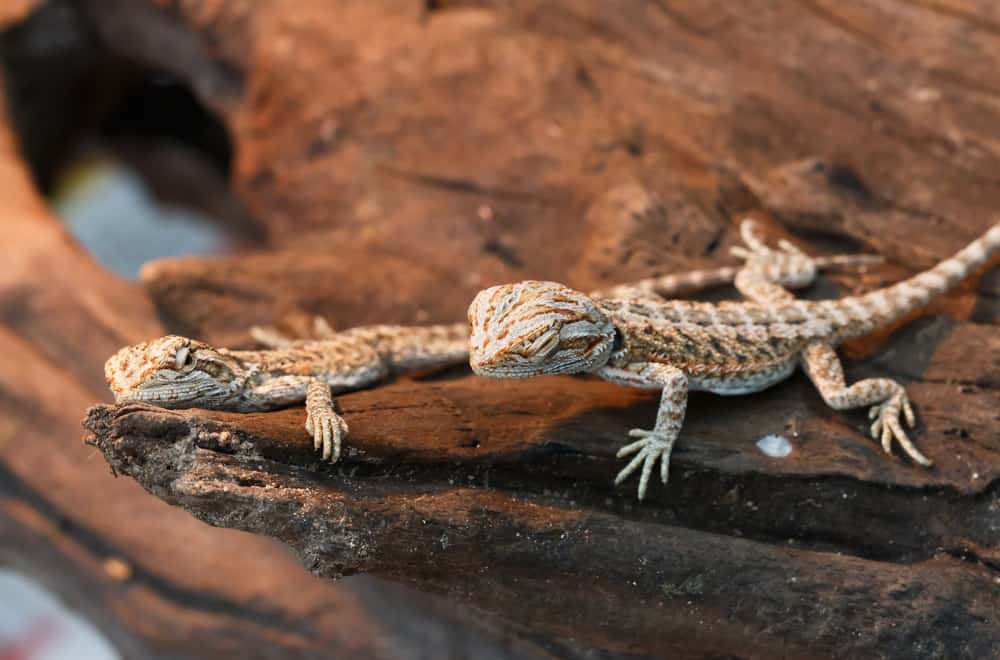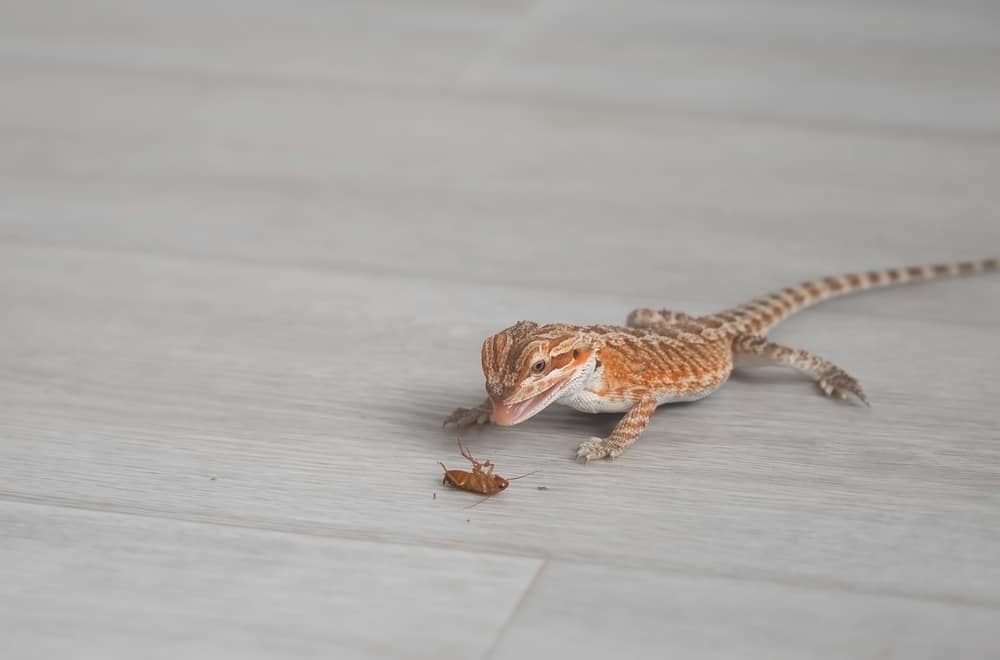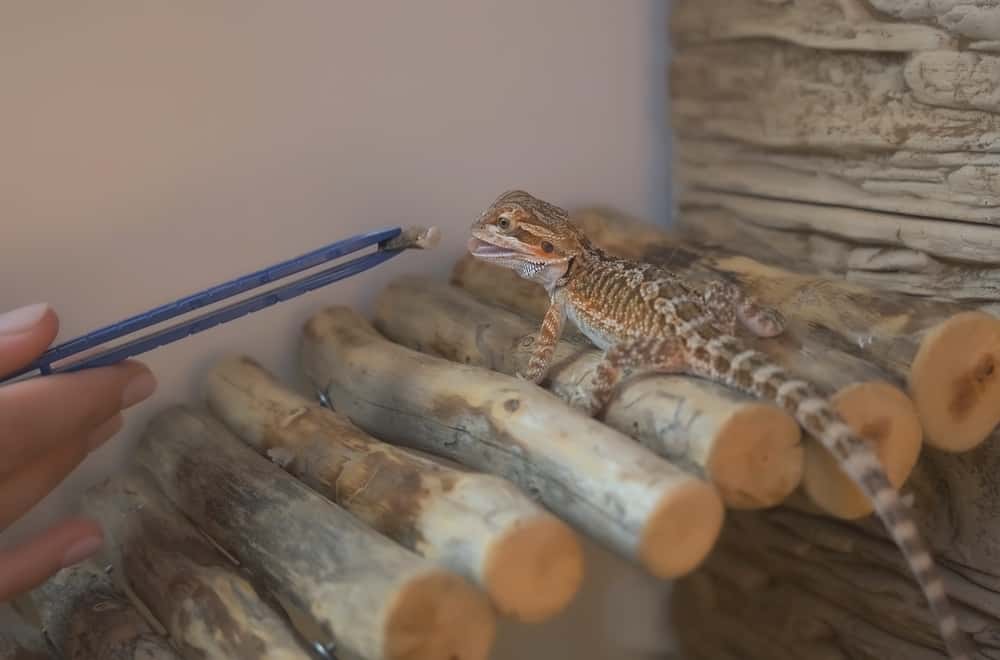Baby Bearded dragons are tiny spiky creatures that will crawl under your skin the moment you set your eyes on them. They are funny, energetic, friendly, and easy to take care of. Plus, these lovely creatures don’t need any extra care or living conditions, so the only thing you have to worry about is what do baby Bearded dragons eat and when.
Baby Bearded Dragons Habits and Biology
Baby Bearded dragons become independent as soon as their mom dragon lays eggs. From that moment, they stay alone, and no one takes care of them.
As the saying goes, nature is a mother to some while stepmother to others. However, these cute little creatures are surprisingly tough as they start their lives and can successfully take care of themselves.
Since their survivals depend only on themselves, these reptiles are shy and appreciate solitude. Nonetheless, they can be friendly, kind, and gentle pets, and your kid will be crazy about this ugly beauty.
Moreover, Bearded dragons are safe pets as they nearly never bit, only if being in life danger. Finally, they are low maintenance regarding cleaning, grooming, and walking. Once you learn their eating habits, there are no other problems and demands.
Mother Nature makes sure these babies have spikes all over their bodies to protect themselves from snakes, birds, and other predators. They can grow up to 2 feet (61 cm), but the tail is usually half or more than half of their length.
Babies are approximately 8 to 23 inches long (20 to 60 cm) and weigh 0.7 to 14 ounces (20 – 400 g). You can see tiny ear holes on their heads and spikes around and under the head. Their spiky beard is a way of body language for many things to say, such as ‘I am the boss here!’ in mating season.
They love climbing, and having sharp claws on all four legs makes their lives easier while overcoming obstacles. They live in hot, dry places, and when they are hot, they hyperventilate by keeping their mouths wide open.
Do Baby Bearded Dragons Eat Dirt?
Baby Bearded dragons in captivity will occasionally eat dirt. Their bodies crave a lot of calcium to keep their skeleton strong. To have a balanced intake of this mineral, they may dig and eat sand, so there is nothing to worry about. It is not typical behavior in nature since they usually get enough calcium from food in their habitats.
Unless you want them to eat dirt, you can prevent this by spraying food with calcium powder. Another crucial thing is vitamin D. You should provide enough light by using a UV lamp during winter when there is not enough sunlight. That way, you will imitate the natural desert environment where they originate from.
What Do Baby Bearded Dragons Like to Eat Most
First of all, there is a difference between feeding the baby Bearded dragon and an adult dragon. Practically, hatchlings are alone from the moment they come out from eggs, and they need to search and find their food from the very beginning.
Regarding food choice, it is the same for youngsters and adults, but the ratio is different. Bearded dragons belong to a group of omnivores, meaning they eat both animals and plants.
While they are young, they should eat food that contains 75% of animal proteins and 25% of plants. As time passes by, that ratio slowly changes into 25% animal proteins and 75% plants.
Insects
Regarding preferences, both baby Bearded dragons and adult dragons are gluttons and crazy about insects. Although being omnivores, some are hard to force to eat veggies as much as they should eat.
On the other hand, when it comes to insects, they will catch and swallow everything that comes in their proximity. They won’t care whether it is beneficial or harmful for them. Their favorite bugs are:
- Black soldier fly larvae
- Butter worms and earthworms
- Red worms and super worms
- Cockroaches and Dubia roaches
- Crickets and locusts
These insects are healthy food for your baby Bearded dragon, and it will enjoy eating them at any time. You need to feed your pet with the right amount of insects you can buy in the local pet shop.
It is not advisable to catch insects around your home or in urban areas. They are usually highly contaminated with pesticides and other harmful chemicals, so it is better to avoid them to keep your baby healthy and prosperous.
Vegetables
Veggies are essential to feed to your baby Bearded dragon, even if they don’t want to. You should never forget that your pet can live even 15 years if you properly feed and care about it. Therefore, you shouldn’t give up no matter what vegetable type want to offer:
- Broccoli, cabbage, and kale
- Mustard greens
- Pepper
- Squash, zucchini, and pumpkins
- Potatoes and sweet potatoes
- Dandelion greens and collard greens
- Peas
- Carrots and beet tops
The vegetables are full of nutrients necessary for your baby Bearded dragon, particularly when it is raw and fresh. However, if they are too hard to chew, you should boil ingredients and serve them at room temperature.
That way, they will lose some vitamins, but it will be safe to chew and swallow. Another option is to chop chosen vegetables into small pieces before offering them to your hatchling.
Fruit
As you can imagine, baby Bearded dragons like treats just like any other kids, but sweets and chocolate are not options in this case. However, they will adore and enjoy the delicious fruit, such as:
- Apples and peaches
- Bananas
- Grapes
- Raspberries, blueberries, and strawberries
- Watermelon
Fruits have a lot of vitamins, minerals, and valuable nutrients necessary for hatchlings’ diet. However, they shouldn’t be part of every meal but a reward for your little pet.
You can add necessary vitamins and minerals to their diet if necessary. The best option is to find them as supplements in the local pet shop. You should use them as prescribed on the labels and ask a vet for advice.
Food Avoid to Feed Baby Bearded Dragons
Some food can be harmful and even toxic to baby Bearded dragons, while others don’t have enough nutrients. The list of insects, veggies, and fruit that you shouldn’t feed your tiny creatures with includes:
- Insects that glow, like fireflies
- Venomous insects, including wasps, spiders, bees, and scorpions
- Bread
- Oranges
- Avocado
- Eggplant
- Onion and garlic
- Celery and spinach
- Fish
- Chicken and beef
Bearded dragons should eat as they eat in the wild. That means meat and fish are not good options for them. They will do no harm but are greasy and have high phosphor levels that can jeopardize your reptile’s health. Most baby Bearded dragons will hardly get used to eating them.
If you take your baby Bearded dragon outside for a walk or picnic, you should take good care of it since fireflies and illuminating insects and worms can be lethal to it. They contain toxins that can kill your pet even if consumed in a small dosage.
The same goes for avocado, garlic, eggplant, and onion, as they are toxic. Even if your baby grabs a small amount, these plants can be very harmful.
When it comes to citruses, like lemons and oranges, their acid will irritate a hatchling’s stomach. Bearded dragons are not prepared for the acidic content in their stomach by nature.
Tips to Feed Baby Bearded Dragons
Once you prepare food, the question is how to feed your baby Bearded dragon. As any other hatchlings, it grows and needs nutrients, especially proteins. Therefore, you need to feed your pet regularly and in specific amounts. The food should not be in big pieces and always clean its living space from leftovers to prevent rotting.
The baby dragons should get about ten or more small insects per meal. Let the reptile eat for 15 minutes and see how many it can consume at once. That will be your guideline for the next time. Remember that 25% of the meal needs to be vegetables.
You should feed your pet at least 3 to 4 times a day, ideally two times in the morning and two times in the afternoon. I will give you an example to help you get an idea of how to feed it, but you can change the kind of insects, veggies, and fruit as necessary according to your wishes.
- 9 AM – Give your baby at least ten small insects, one collard greens, one slice of bell pepper, and one strawberry.
- Noon – Approximately ten Dubia roaches, two kale, one slice of squash, and one blueberry will be enough for the second meal.
- 3 PM – Offer the baby dragon ten small crickets, two dandelion greens, a slice of a pumpkin, and a piece of banana.
- 6 PM – It is time for ten small insects, a slice of bell pepper, two collard greens, and one grape.
Summary
For a healthy and long Bearded dragon lifespan, you should feed your baby pet regularly and adequately. Remember that its appetite is big for insects, but you can help it have a healthy diet. This reptile also likes treats just like any other hatchlings, but be moderate with them.


